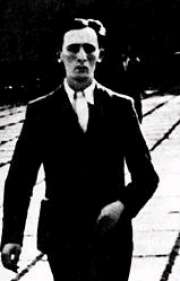|
Биография Alexandru Robot
Al. Robot sau Alexandru Robot (n. Alter Rotmann pe 15 ianuarie 1916, București - d. cca. 1941, probabil în apropiere de Odessa) a fost un poet român afirmat pe scena literară din Basarabia. Lirica sa împrumută elemente din simbolism, expresionism și ermetismul lui Ion Barbu. Singurele sale plachete de versuri, publicate la o vârstă fragedă, au stârnit câteva reacții oarecum simpatetice din partea criticilor, fiind introdus de G. Călinescu în Istoria sa a literaturii române... În ultimii ani, s-a reprofilat pe realismul socialist (având deja vederi de stânga). I-a influențat mai târziu pe neomoderniștii (de ex. Aureliu Busuioc) și postmoderniștii (de ex. Emilian Galaicu-Păun) basarabeni.
Ediții publicate
* Apocalips terestru, Editura Cronicarul, 1932, cu un portret al autorului de I. Anestin
* Somnul singurătății, 1936
* Music-hall (roman)
Manuscrise
* Îmblânzitorul de cuvinte
* Plecările și popasurile poetului
* A înflorit Moldova
Ediții postume
* (ediție de Simion Cibotaru din anii 60)
* Scrieri, Editura Minerva, București, 1985
* Îmblânzitorul de cuvinte. Versuri și proză, Litera Internațional, București/Chișinău, 2003
Alexandru Robot (Romanian pronunciation: [alekˈsandru robot]; born Alter Rotmann, also known as Al. Robot; Moldovan Cyrillic: Александру Робот; January 15, 1916 – ca. 1941) was a Romanian, Moldovan and Soviet poet, also known as a novelist and journalist. First noted as a member of Romanian literary clubs, and committed to modernism and the avant-garde, he developed a poetic style based on borrowings from Symbolist and Expressionist literature. Also deemed a "Hermeticist" for the lexical obscurity in some of his poems, as well as for the similarity between his style and that of Ion Barbu, Robot was in particular noted for his pastorals, where he fused modernist elements into a traditionalist convention.
Adopted by the literary circles in Bessarabia region, where he settled in 1935, Robot was employed by the literary review Viața Basarabiei. In tandem with his avant-garde activities, he was a political-minded journalist with communist sympathies, who wrote reportage pieces and essays around various social, political and cultural topics. During the 1940 annexation of Bessarabia, Robot opted to stay behind in Soviet territory, adopting Socialist Realism and paying allegiance to the Moldavian SSR's official line on nationality issues. This move sparked a posthumous controversy, but some have argued it only implied a formal submission on Robot's part.
Robot was declared missing some two months after the German-Romanian takeover of Bessarabia, dying in mysterious circumstances. His avant-garde literary work remained largely unknown until the 1960s, when it was rediscovered by a new generation of Bessarabian writers.
Early life
The future poet was a native of Bucharest, born to Jewish Romanian parents Carol Rotman and Toni Israel, with a working class family background. His father was, according to conflict accounts, either a clerk or the warden of a Jewish cemetery in Bucharest. Alter Rotmann studied for a while at the city's Spiru Haret High School, but dropped out in order to begin work as a reporter for the cultural magazine Rampa, and later had his articles featured in such periodicals as Universul, Cuvântul Liber and Viața Literară.
Robot made his editorial debut in 1932, at age 16, with the lyric poetry volume Apocalips terestru ("Terrestrial Apocalypse"). Over the following period, he was acknowledged in sympathetic literary chronicles authored by critics with academic credentials or by fellow poets, among them George Călinescu, Eugen Lovinescu, Perpessicius and Ion Pillat. Writing in 2006, Moldovan philologist Vladimir Prisăcaru (Vlad Pohilă) defined the then aspiring author as "a precocious and vigorous, picturesque, dissipated and extremely prolific talent."
The poet was survived by his wife, who lived in relative obscurity in the Soviet Union and later in Moldova. In old age, she was interviewed by Moldovan journalist Gheorghe Budeanu, who recorded her recollections about life with Alexandru Robot, and details about the lesser known aspects of his biography. According to Colesnic: "she has not only rendered complete the portrait of poet Alexandru Robot, but also enhanced the enigma that still floats around [him]."
|





